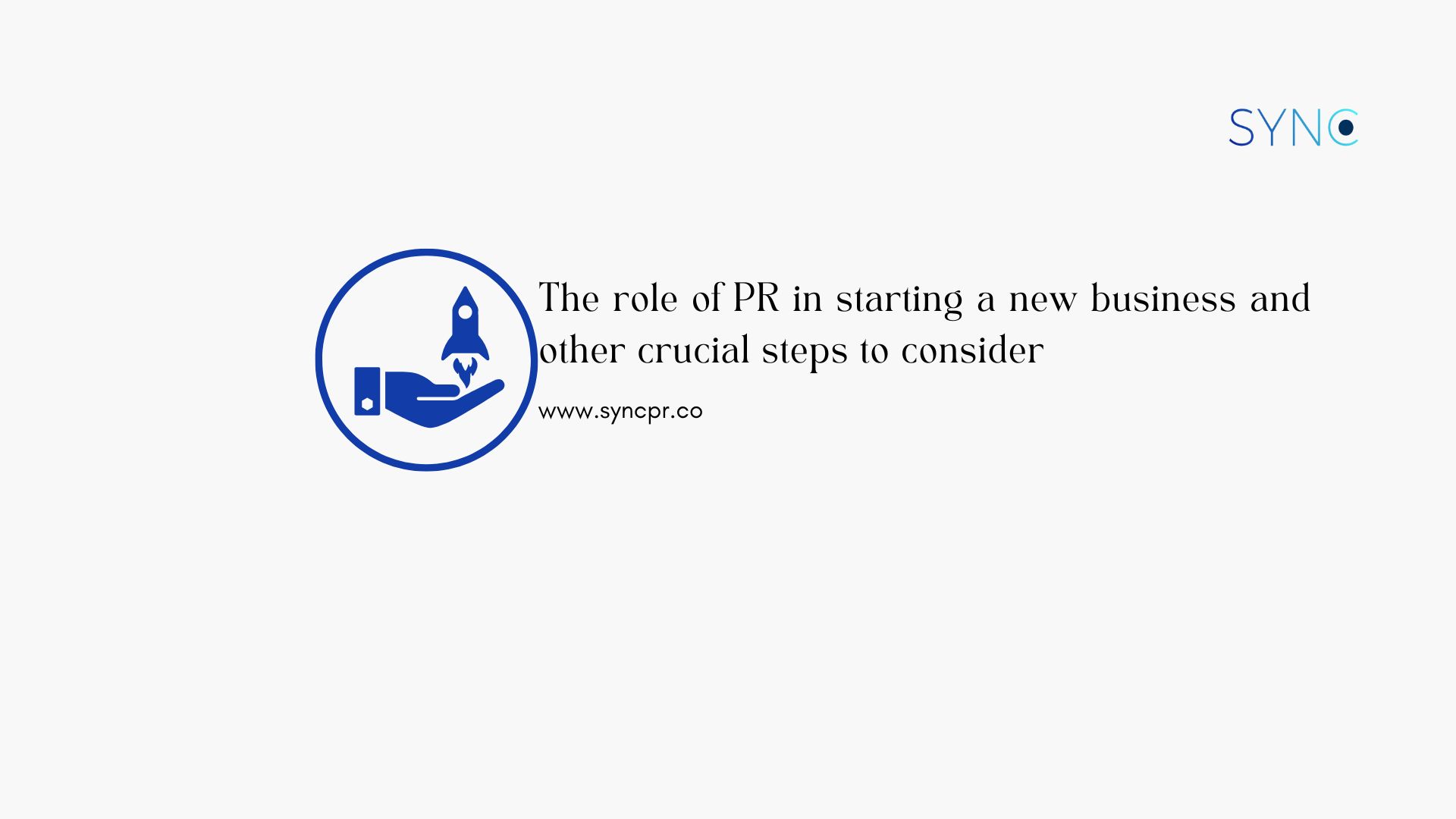How crucial is the role of PR in starting a new business?
Starting a business is a thrilling endeavour marked by ambition, vision, and a leap into the unknown. The role of PR in starting a new business cannot be overlooked.
Whether driven by a groundbreaking idea or a desire for independence, the journey from concept to execution requires meticulous planning and strategic execution. Amidst the exhilaration, crucial steps must be navigated to lay a solid foundation for success. This foundation lays the platform in which smaller businesses will have the ability to translate their business into a bigger enterprise eventually.
Huge enterprises like Apple and Microsoft all had to start somewhere. In the case of Microsoft, co-founders Bill Gates and Paul Allen identified a seizable opportunity in the market, forecasting the development and growth of technology shortly. Through thorough market research and successful research and development (R&D), they were able to skyrocket their growth, placing themselves as one of the leading companies in technology and infrastructure. They also valued the role of PR in starting a new business and achieved steady business growth and scalability.
Sounds difficult? Not if you follow these 5 steps and leverage the role of PR in starting a business.
Step 1: Ideation
Discovering the idea is the first step in every business. Your idea will define your business. Make sure the idea is related to a topic about which you have decent knowledge and the topic should be relatable. Your idea should have qualities of problem-solving, scalability, relatability, refreshing, and innovation. Find a problem worth solving or a need that isn’t adequately met.
If you’re unsure about the specifics of your business idea, consider these questions:
- What activities do you enjoy the most?
- What tasks do you find least appealing?
- Can you identify solutions that could simplify those tasks?
- What skills do you excel in?
- Which areas do people seek your advice on?
- If you had ten minutes to give a speech on any topic, what would you choose?
- Is there something you’ve always wanted to pursue but lacked the necessary resources?
These questions can guide you toward generating a business idea. If you already have an idea, they can assist you in refining and expanding it. Once you have your concept, assess it based on whether you possess the necessary skills and if it has the potential to be financially viable. Now, all you need to do is, take the idea and sell it- this is where the role of PR in starting a new business comes into play.
Step 2: Strategic business planning
Develop a detailed business plan that outlines your business goals, target market, products or services, pricing strategy, marketing plan, operational plan, and financial projections. A well-crafted business plan serves as a roadmap for your business and is essential for attracting investors or securing loans. The role of PR in starting a new business and developing strategic plans is also crucial.

Research the market gap in which your product or service can solve including costing, digitisation, accounting, etc. Focusing on research and development (R&D) assists the ease of entering the market, lowering the barrier of entry significantly. Through this research, your company can ultimately build a minimum viable product (MVP) that will have a goal of securing lead generations. By clearly articulating what makes your product/service unique and valuable, interest is created at the basepoint of the product, leading to a cascading effect of increased interest.
By writing a business plan, banks are more likely to give loans to companies that can clearly explain how they will use the money and why they need it. This will have a direct impact on the performance of your business, as it is heavily dependent on the planning and the ability to execute these said plans. Without financial aid, plans will come to a halt, disrupting the positive momentum of your business. This leads to step 3.
Step 3: Setting up necessary finances and funding
Finance is the backbone of every company’s operations, enabling companies to prepare for the future by allowing them to make informed decisions. Proper financial planning helps allocate resources efficiently, identifying where the company can conserve or spend money. This enables organisations to run effectively and plan for unforeseen circumstances, maintaining momentum for future growth and success. Another important thing to remember is the role of PR in starting a new business and how it can help secure funds.
The cost of a startup is different for every business. However, regardless of the costs, most of your startup financing is from the sources listed below:
- Friends and family: Your family and friends are more inclined to provide you with some financial support if they believe in you and your project.
- Angel investors: Angel investors are investors that provide initial seed money for startup businesses, usually in exchange for ownership equity in the future. The series Shark Tank represents angel investors in action t showcasing angel investors and their willingness to invest in early startups.
- Venture capitalists: A venture capitalist (VC) is an investor in private equity who offers funding to companies poised for high growth in return for ownership shares. VC investments typically support startups or small firms seeking expansion opportunities when traditional equity markets are inaccessible.
- Bank loans: Typically, banks do not provide loans to smaller businesses due to their unproven financial records. However, government initiatives have helped reduce this issue by providing benefits to banks that are willing to invest in small businesses to help skyrocket their launch as a businesses.
Step 4: Having a legal structure and registration
Businesses need to have a proper legal structure in place, ensuring that their comapnies are legally run and registered according to the law. Here are a few steps to ensure that your business is abiding by the law:
- Select a legal structure for your business, such as sole proprietorship, partnership, limited liability company (LLC), or corporation.
- Consider factors such as liability protection, tax implications, and operational flexibility when choosing the right structure.
- Complete all necessary legal formalities, including registering your business name and obtaining any licenses or permits required.
- Open a business bank account and set up accounting and financial systems.
Once these requirements are met, following the country’s laws and regulations, the steps to registering your business differ. In Malaysia, this is how you register your business.
Step 5: Setting up your operations
Once you have set up your business location, obtained permits and licenses, established brand identity, and developed a marketing strategy, companies should look towards developing a launch strategy that creates buzz and attracts potential customers. Trust and reputation with the stakeholders as well as customers will influence the perception of your company and ultimately decide the performance of your business. Build relationships and communicate with customers, partners, and industry influencers. The role of PR in starting a new business cannot be overlooked for setting up operations and building a network too.
The role of PR in starting a new business
Now that your business is up and running, you will need strong public relations (PR) initiatives to launch your business and announce your platform to the world. A good example to understand the role of PR in starting a new business would be Grab. Transformed into Southeast Asia’s leading ride-hailing and on-demand services platform, Grab used PR to raise awareness and build trust among consumers and stakeholders. This was done by engaging local media to cover their expansion across Southeast Asia, highlighting their main features and benefits. This helped Grab establish itself as a reliable and innovative transportation solution in the region, paving the way for its rapid growth and dominance in the market.
Therefore, a new business needs to start strong with reliable PR and help put its name among the successful companies, shaking up the stratosphere of the business landscape. The role of PR in starting a new business is vital.
Is this all it takes to start a business?
The answer is yes and no. In a broad spectrum of running and starting a business, entrepreneurs and future business owners can look to utilise this step-by-step guide to assist in their decision-making and planning. However, it is obvious that when running a business, you have to consider much more than what this guide can provide. This includes small nuances of how to manage your business properly, or having to adapt to unforeseen circumstances coming up during planning and execution. And, of course, you must remember the role of PR in starting a new business and taking it to new heights.
If you want to understand more about how you can start your business and learn more about the role of PR in starting a new business drop us an email at hello(a)syncpr.co.

